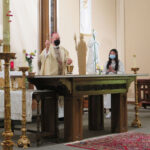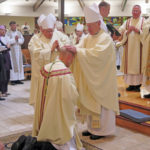
Dan Ebener recalls a conversation with a woman who had been active in her Catholic parish but then left it. “I listened to her story for a whole hour. At the end of that hour-long conversation, she said, ‘Dan, if somebody in my parish had listened to me like you did this last hour, I’d still be a Catholic. I’d still be a member of the parish.’”
Dan, who serves as director of Parish Planning for the Diocese of Davenport, shared that story with parish representatives preparing to organize Synod listening sessions and conversations in and outside of their parishes. Dan described his conversation, which happened outside the diocese, as the most powerful moment he has experienced in one-on-one conversations. “People want to tell their stories,” he said. His conversation partner had issues with Church teaching, which Dan could not change nor did she expect him to change. She wanted to be listened to, understood and respected.
Last fall, Pope Francis opened Synod 2021-2023, inviting “the whole Church on a two-year journey of reflection and sharing of the whole Church.” The word “Synod” means to journey together. Our diocese asks each of us, during this winter and spring, to journey with others in conversation, in and outside the church.
We must give every voice the opportunity to speak, especially the voices of people on the margins, the people neglected or ignored in our society. We must be a listening Church that learns from one another’s experiences and perspectives, grounded in prayer, trusting in the Holy Spirit to guide us. “If you want to be heard, you must be willing to listen,” the narrator in an animated video by Rahai, “All You Need to Know” about the Synod on Synodality, advises us.
Our conversation begins with a simple, but deeply inspiring question that our diocese has adapted from Synod 2021-2023 to encourage conversations with a broad spectrum of conversation partners:
Based on your personal experience, what fills your heart and what breaks your heart about the Catholic Church (e.g., in your parish or beyond your parish)? The diocese asks us to have three separate conversations with someone already in the pews; someone who used to be in the pews but hasn’t since the pandemic; and someone who has never been a part of a faith community or stopped practicing long ago.
Dan offers these important tips for listening, which will lead to fruitful conversation:
• Be aware of our biases and judgments. We cannot be objective until we are honest about our own subjectivity.
• Suspend judgment — in what we say, how we react and in our facial expressions and body language. We are to be welcoming in every way possible.
• Summarize what we hear our conversation partner say. This demonstrates our active listening and gives our conversation partner an opportunity to clarify comments.
• Do not “hijack” conversations. For example, if someone says, “My mother just had surgery and I’m worried about her,” we should not hijack the conversation by talking about our mother’s recent surgery.
• Ask open-ended questions. Ask, “What is your relationship with the parish? Don’t add, “How often do you go to Mass” unless the conversation partner asks for advice.
• We are to be humble in listening, resisting the temptation to interject or correct what we perceive to be errors about Church teaching.
“While it is easier to listen to people who already agree with us, we are more likely to learn something new by listening to those who disagree with us,” Dan says in an article titled “Priests as Leaders: How to foster adaptive change” (February 2022, the priest.com). “Listening to understand and to empathize does not constitute agreement, but it helps build bridges and break down fences.”
Now is the time to reach out to someone for conversation, preferably in person, and in a setting that is comfortable for our conversation partner — a coffee shop, the dinner table, or on a walk, perhaps. Following our conversations, we are to reflect on them, and share our brief reflections (without naming our conversation partner) on a diocesan web page dedicated to the one-on-one conversations called the “58,000 Cups of Coffee” initiative (https://tinyurl.com/mr3tn2ap).
Dan’s conversation with the woman who left the Church may or may not inspire her to return, but it helped both of them to experience God’s presence and grace on this pilgrim journey.
Barb Arland-Fye, Editor
arland-fye@davenportdiocese.org











